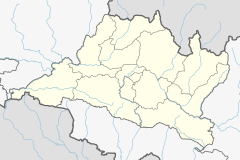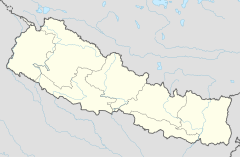Nautalle Durbar
Appearance
| Nautalle Durbar | |
|---|---|
नौतले दरबार | |
 Nautalle Durbar in 2014 | |
| Alternative names | Basantapur Tower |
| General information | |
| Location | Hanuman Dhoka, Kathmandu Durbar Square |
| Coordinates | 27°42′14″N 85°18′27″E / 27.703881611584134°N 85.30747693218386°E |
Nautalle Durbar (Nepali: नौतले दरबार; sometimes known as Basantapur Durbar (Nepali: बसंतपुर दरबार)) is a palace in Hanuman Dhoka, Kathmandu Durbar Square.[1]
It was built by Prithvi Narayan Shah to commemorate the Unification of Nepal.[2] During the April 2015 Nepal earthquake, the top tiers collapsed.[3][4]
Nautalle Durbar also served as the early residence of the King of Nepal.[5]
The Nautalle Durbar is an important and iconic structure in Bhaktapur, which is one of the ancient cities of the Kathmandu Valley. The palace is famous for its nine stories (hence "Nautalle" meaning "nine-story"), and it has been an important part of the history and architecture of the Kathmandu Valley.[6]
References
[edit]- ^ Amatya, Rishi (July 2010). "On the Ninth : Nautalle Durbar". ECS NEPAL. Retrieved 21 November 2021.
- ^ Shrestha, Narayan P. (1997). Kathmandu, the Eternal Kumari: An In-depth Guide to the Sacred Places, Historic Sites, and Important Monuments of Kathmandu Valley. Saroj & Kauz. p. 137.
- ^ "Basantapur (Kathmandu) Tower". Lonely Planet. Retrieved 21 November 2021.
- ^ "Nepal's Kathmandu valley treasures: Before and after". BBC News. 27 April 2015. Retrieved 21 November 2021.
- ^ Sanday, John (1979). Monuments of the Katmandu Valley. Unesco. p. 64. ISBN 978-92-3-101644-8.
- ^ "Kathmandu Valley - UNESCO World Heritage Centre Tower". UNESCO World Heritage Centre. Retrieved 17 October 2024.


